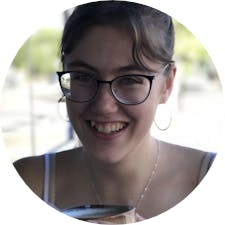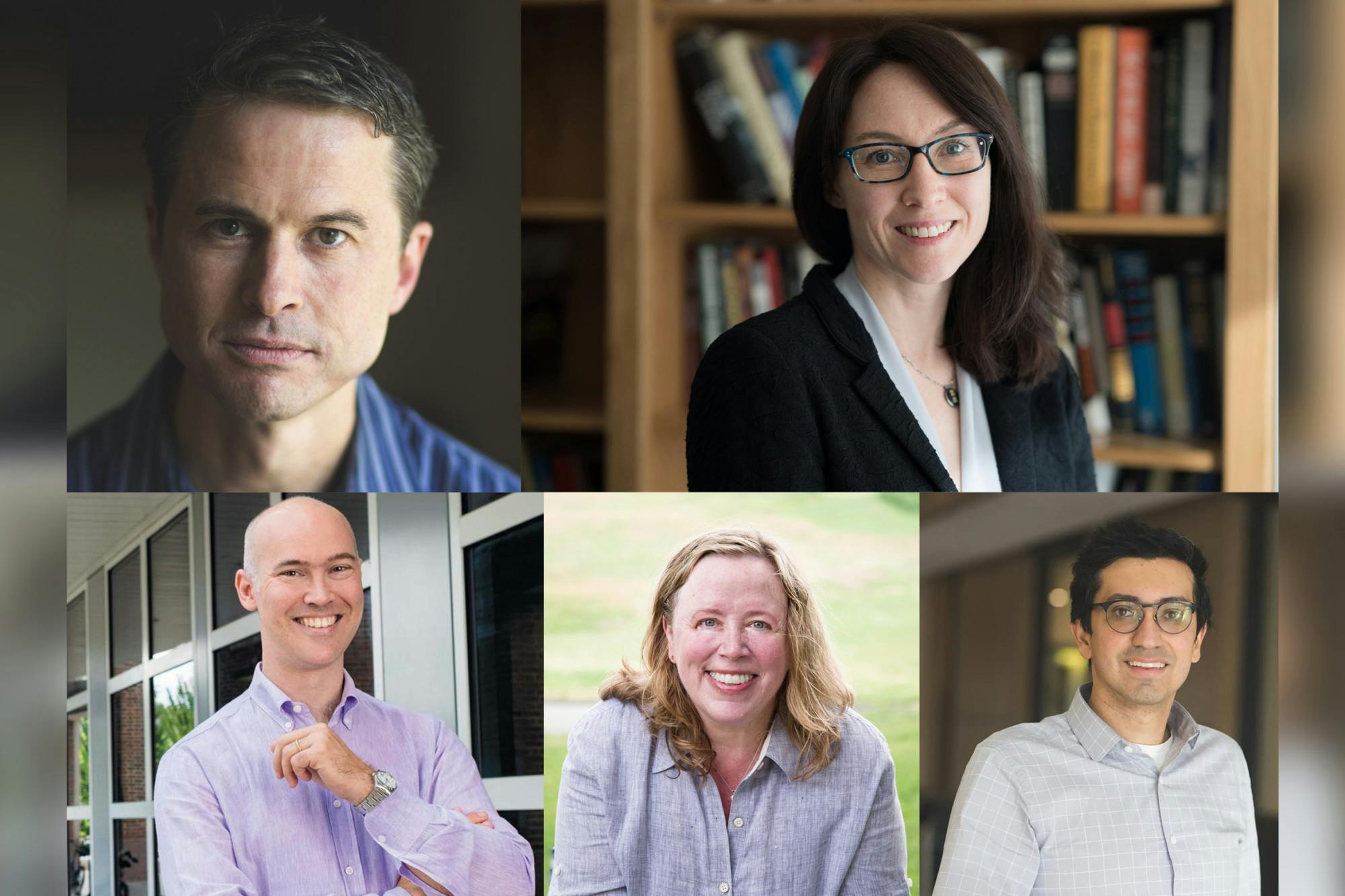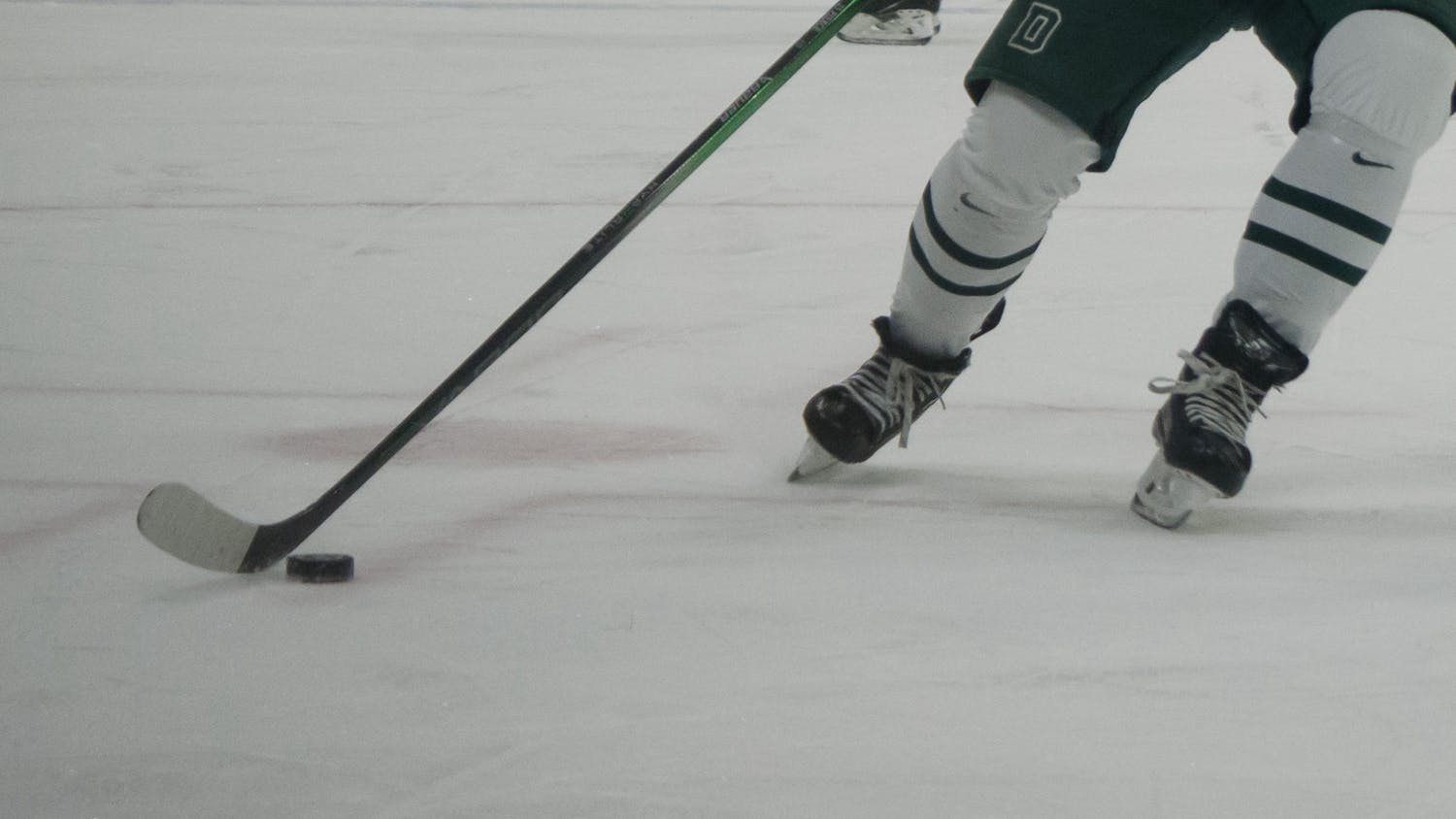As an undergraduate-focused R1 institution, Dartmouth sits at an intersection between research and teaching. According to some professors, the College prioritizes both aspects of the “teacher scholar mindset,” encouraging professors to equally prioritize their research and undergraduate teaching. This model provides several advantages, such as collaboration with other professors across disciplines, teaching that inspires novel research and access to substantial funding.
In order to understand the relationship between teaching and research, The Dartmouth spoke to professors across various fields, including art history professor Nicola Camerlenghi, computer science professor Soroush Vosoughi, English and creative writing professor Carolyn Dever, history professor Julia Rabig and government professor Brendan Nyhan.
Professor Camerlenghi, along with art history professor Mary Coffey and Eastern European Studies professor Mikhail Gronas, collaborated on a project called “Augmented Dartmouth” — a mobile application which allows users to point their cameras at locations on Dartmouth’s campus, including “The Epic of American Civilization” by José Clemente Orozco and “Virgin and Child with Saints” by Perugino, and learn more about the history and significance of the location or artwork. The team is currently working with researchers at the University of Rome to expand “Augmented Dartmouth” to “Augmendo” — a technology for art, games, tourism and education more broadly, according to Camerlenghi.
“It started with the 250th anniversary of Dartmouth College … and then from there, I think we realized that we had something very exciting that could be interesting to auction houses, museums and private collectors,” Camerlenghi said. “That is, a capability of simply pointing your phone to an object and having curated, intelligent insights pop up.”
In the humanities, Dever — an expert in 19th century English literature and culture and gender studies — researches two 19th century women who wrote under the name Michael Field. Dever said she is transcribing a manuscript to make the womens’ work more accessible, and it will soon be available to the public. She’s currently working on Michael Field’s 30-volume shared diary from the late 19th and early 20th century.
“It's a manuscript diary, meaning it’s never been fully transcribed, and it exists in the British Library in London,” Dever said. “I've been flying back and forth and making notes and transcriptions for many years, and have recently published one book and will publish a second book about this diary, as the first person who’s really begun to dig into it. It’s about 10,000 pages long.”
Rabig works on Dartmouth Black Lives, a collection of Black alumni experiences, with her bi-annual class HIST 10.04, “Dartmouth Black Lives.” Another research project Rabig said she is working on is a history of public libraries.
“[Dartmouth Black Lives] collection of oral histories of Black alumni is more of a community based project that involves teaching the course where students learn the theories and methods of oral history, and they conduct their first interview,” Rabig said. “I’m working on a history of urban Public Library systems in the late 20th century … as a way to understand how people’s ideas about urban public space are changing.”
Nyhan has been researching misinformation and echo-chambers on social media. Nyhan has also become a political blogger, writing for a public audience in addition to an academic audience.
“At this point, I primarily study misinformation and how to correct it, and threats to democracy and how to counter them,” Nyhan said.
In the computer science department, Vosoughi works on socializing language models in AI in the Minds, Machines and Society lab. According to Vosoughi, he works on natural language processing and designing technical methods to mitigate the antisocial tendencies of some NLP models.
“The concern around using large language models in real world situations is that these models are trained on data from the web,” Vosoughi said. “So, if there’s toxic speech, bias, stereotype or whatever, all of that stuff is actually captured by these models.”
All five professors echoed the advantage that undergraduate teaching brings to their research. According to Dever, teaching allows her to better conceptualize her research.
“The research begins to make sense when I begin to communicate with students about it,” Dever said. “Even the act of teaching a class that seems unrelated to my research, or only tangentially related … helps me to focus my attention on important things within Michael Field [research]. So it’s really because of the teaching that the work comes alive.”
Rabig explained that her research influences the content she teaches. While the structure of Rabig’s HIST 23, “American History Since 1980” course remains the same year after year, she frequently introduces new readings — which are often inspired by literature Rabig discovers while researching.
“[Research] helps me keep abreast of the literature, so I am teaching the most current historiography,” Rabig said.
Teaching also helps professors find students who are interested in working with them on their research, or find students who are interested in starting new projects. Nyhan said that students’ hands-on, collaborative experience is a signature of a Dartmouth education.
“[Students] ask questions and challenge me in ways that inspire and improve my research,” Nyhan said. “I also teach an experiment seminar where students work with me to design, conduct and hopefully publish a study … related to political misinformation and misperceptions directly.”
Vosoughi, who was initially apprehensive that time spent teaching would detract from his research, has come to recognize its value. Before teaching at Dartmouth, Vosoughi said he researched at the Massachusetts Institute of Technology as a postdoctoral fellow and doctoral student. According to Vosoughi, MIT is research-focused and that teaching is secondary. However, at Dartmouth, Vosoughi said the “teacher-scholar” model is emphasized.
“It’s interesting because Dartmouth is an R1 — R1 is just classification based on the research output, and R1 is the highest,” Vosoughi said. “So Dartmouth’s interesting because it’s small compared to [other R1 schools] but still has that output.”
Coming from a larger R1 school, Vosoughi didn’t know how important teaching would become.
“I’m enjoying teaching quite a lot and actually looking forward to teaching every time,” Vosoughi said. “[Teaching] has allowed me to really understand some of the concepts in my field because it's true that you won’t understand something fully until you try to teach someone.”
The teaching and research community at Dartmouth has also helped Camerlenghi grow his research. Conversations with colleagues outside of one’s specialty can also lead to connections that redirect or expand research. For instance, Vosoughi said serving on a senior thesis committee connected him with a professor in biology. Following the thesis, Vosoughi and the professor discussed how large language models can apply directly to genomics.
Additionally, these intersections branch out into all Dartmouth faculty, including librarians. Camerlenghi said Ilana Grallert, a librarian at Rauner, reached out because “Augmented Dartmouth” was an opportunity to share the Dartmouth cemetery’s history. According to Camerlenghi, Grallert knows the “ins and outs” of the cemetery,” so whenever she is not available to give tours, Augmendo could share the cemetery’s stories in a digital capacity.
Nyhan said that community and teamwork in the field have transformed otherwise solitary writing into collaborative efforts.
“Social science, especially computational social science, has become much more team-based than it has been in the past,” Nyhan said. “We see a lot more research produced by groups of co-authors. So more of a production model that’s more typically associated, historically, with the natural sciences has now become common in social sciences.”
However, a lot of work professors do, especially archival work, is still solitary. Sometimes professors are required to travel internationally to visit the archives they need. Dever visits London and the Michael Field archives multiple times a year.
“[In London], I can be in the manuscript room of the library from opening to closing, working really, really hard. Just really digging into that text and seeing what it’s all about,” Dever said. “When I’m here in Hanover, I spend my time digging through those notes, reading the context that other scholars have established around all of these related topics and then writing articles and books about this material.”
According to Dever, archival research is difficult to do when it comes to funding. Dever emphasized the challenge with humanities funding, and her gratitude that Dartmouth supports humanities research.
“Funding is so important, and I feel really privileged,” Dever said. “There are a lot of important research projects out there and not enough resources to get scholars or experts to the projects.”
Nyhan has seen his research change drastically with new technologies and social media. For instance, Nyhan noted that previously researchers conducted field surveys for data, but now many researchers use data collected from social media sites instead.
“The biggest change in my field has been the shift from surveys to digital behavior data,” Nyhan said. “We used to have to ask [individuals] where they got information and now, more than ever before, we can actually see, and that’s transformative for understanding. “
This shifting technology can add a challenge for professors who have to keep up with new developments.
“Frankly, it’s helpful to have students collaborate because they are oftentimes aware of what’s just beyond the horizon in terms of technology,” Camerlenghi said.
In regards to professional challenges, Vosoughi emphasized the importance of acknowledging burnout, especially for young faculty.
“You need to be sure not to overcommit. Faculty, especially junior faculty, pre-tenure, tend to do that,” Vosoughi said. “We want to be very productive, and sometimes you overcommit, and then you get stretched.”
But despite the challenges, some professors said they remain motivated because they are passionate about the material they are researching.
“People have really different relationships to writing, and for me, especially with this particular text — which I think is so interesting, complicated and so challenging — it’s like I’m always happy to go back and dig in again,” Dever said. “So it’s never a question of motivation. It's a question of having enough time to do it well.”

Elle Muller is a ’24 from Tucson, Arizona. She is double majoring in English and creative writing & theatre. At The Dartmouth, she served as the news executive editor for the 180th Directorate. Before that, she wrote and edited for Arts. In addition to writing, Elle is involved with dance and theatre at Dartmouth.




